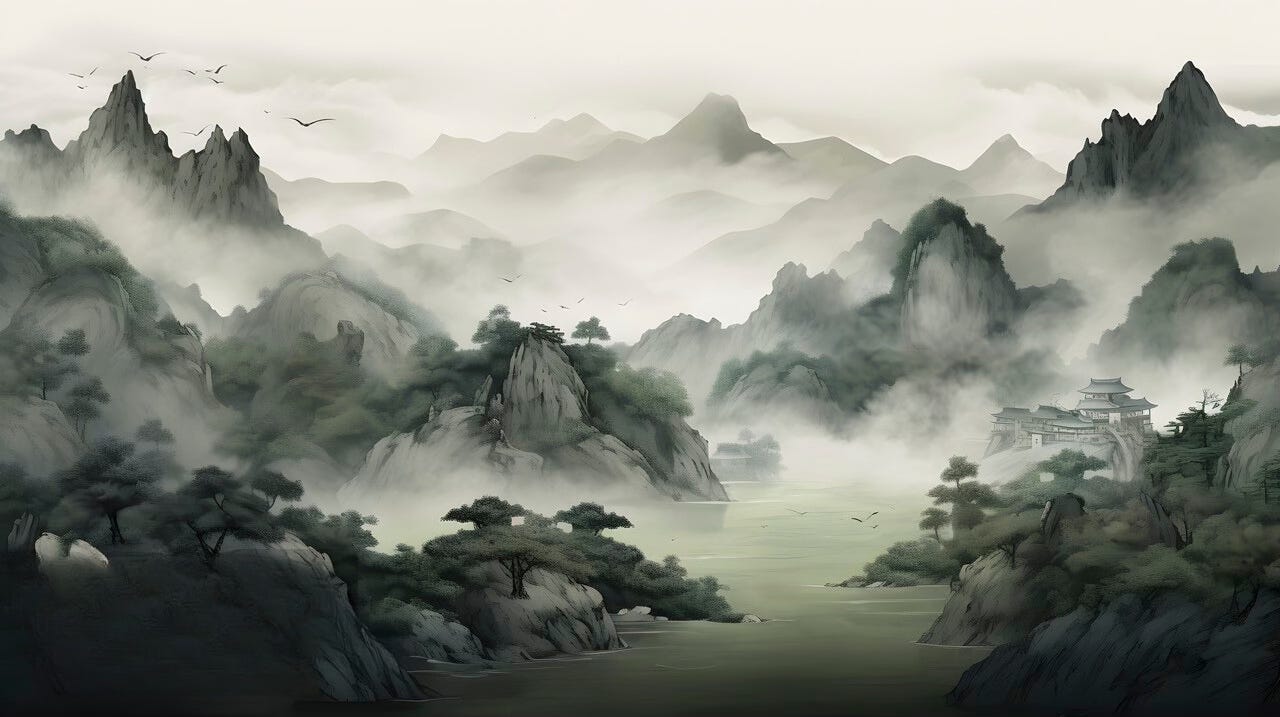The Taoist Idea of Wu-wei
As a state of heightened consciousness. And the hidden meaning in Chuang Tzu’s fables.
The idea of wu-wei 無為, or nonaction, appeared first in the second chapter of Tao Te Ching, which can be read as “the sage keeps to the deed that consists in taking no action and practices the teaching that uses no words”.1
Wu-wei has been explained as many concepts, such as “not forcing,” “effortless action,” “nonaction,” or “unconscious action.”2 Political wu-wei has also been perceived as a particular political technique for administrative purposes.
Chuang Tzu was another representative of Classical Taoism during the Warring States Period (475 - 221 BC). It was through his intellectual efforts that Taoism became a more rigorous and profound philosophical school.
On top of the role of a philosopher, Chuang Tzu was also a master storyteller. In his works, he inserted hidden meanings and ideas into delicately crafted stories and fables.
Chuang Tzu understood that it is extremely difficult, if not impossible, to change a person’s worldview by imposing another perspective or argument.
Whether it is scholarly debates or daily conversations between individuals, we rarely change our preconceived opinions and prejudices because we have been conditioned and deeply invested in our own narratives.
Even if we can come to realize the speciousness of our conceptions, we may still stick to them due to emotional, habitual, or material attachment.
As a result, storytelling might be a more proper way to engage with others because stories invite readers to join the conversations and unwittingly entertain the different narratives underlying them.
In this sense, reading Chuang Tzu can be a joyous and imaginative experience of exploring diverse possibilities and challenging our own limited perspectives.
I have collected three short stories from Chuang Tzu, to illustrate the idea of wu-wei.
The tragedy of imposing on others
Once upon a time, a seabird alighted in the capital city of Lu. The Earl of Lu carried it in procession to the ancestral shrine, where he played the Nine Shao music (a splendid piece of music in ancient China) and offered the offerings of the sacrifice to it.
However, the poor bird just looked confused and lost and did not eat a single piece of meat, nor did it drink even one cup of wine, and within three days it died3.
The story is followed by a comment,
This is the method of keeping birds by one’s own (human) standard, and not by the standard of a bird, by what man imagines the bird likes, and not by what the bird itself likes. To keep a bird by what the bird likes, one should let it loose in a deep forest, let it fly over ponds and islets and float over lakes and rivers. One should feed it with little eels and let it fly or stop where it pleases.
How foolish it is to make so much noise with an orchestra when its only fear is human voices?
The problem with excessive love
There was a man who loved his horse. Every day he would pamper it with a basket for its manure and a fine bottle for its urine.
But when a fly happened to hover near the horse, he voluntarily slapped it.
Suddenly, the horse got annoyed and panicked, smashing his head and kicking in his chest.
There was nothing wrong with the intention but the love did damage. You can’t be too careful.4
The perils of good intention
The Emperor of the South Sea is known as Change.
The Emperor of the North Sea is called Dramatic.
The Emperor of the Center is called Chaos.
Change and Dramatic met every so often in the region of Chaos.
Chaos always treated them kindly and virtuously.
Change and Dramatic said, ‘Everyone has seven orifices so they can see, hear, eat and breathe. Chaos does not have these. Let us bore some holes into him.’ Each day they bored a hole into Chaos… but on the seventh day Chaos died5.
Tao Te Ching, trans. D. C. Lau. (London: Penguin Classics, 1963), 6.
Wu-wei, or nonaction, is not a total absence of action, although it is easy to associate it with a passive mode of life. It is a critical idea for the Taoist natural order.
This story is from the “Perfect Happiness,” in The Book of Chuang Tzu, trans. Martin Palmer, (Penguin Books 2006), 153.
This story is from “Worldly business among men,” in Chuang Tzu: The Inner Chapters, trans. A. C. Graham, (Indianapolis/Cambridge: Hackett Publishing Company, 2001), 72.
This story appeared in “Dealing with Emperors and King,” in The Book of Chuang Tzu, trans. Martin Palmer, (Penguin Books 2006), 64.
A.C. Graham noted that “Hun-t’un (Chaos) is the primal blob which first divided into heaven and earth and then differentiated as the myriad things. In Chinese cosmology the primordial is not a chaos reduced to order by imposed law, it is a blend of everything rolled up together; the word is a reduplicative of the type of English ‘hotchpotch’ and ‘roly-poly’.” See Chuang Tzu: The Inner Chapters, trans. A. C. Graham, (Indianapolis/Cambridge: Hackett Publishing Company, 2001), 98-99.




Reminds me of the time that I used to write parables, inspired from Khalil Gibran. I'm feeling motivated to start the practice again :)